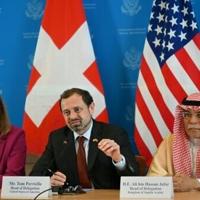Talks on the devastating war in Sudan concluded on Friday without a ceasefire, but progress was made on securing aid access on two crucial routes into a country grappling with one of the worst humanitarian crises globally.
Since April 2023, a war has been raging between the Sudanese army, led by the country’s de facto ruler Abdel Fattah al-Burhan, and the paramilitary Rapid Support Forces (RSF) under his former deputy Mohamed Hamdan Daglo.
This brutal conflict has resulted in one in five people being displaced from their homes, with tens of thousands losing their lives. More than 25 million Sudanese, which is over half of the population, are facing acute hunger.
The United States initiated talks in Switzerland on August 14 with the goal of alleviating the human suffering and establishing a lasting ceasefire.
Although an RSF delegation was present, the Sudanese armed forces (SAF) did not attend due to dissatisfaction with the format, but they maintained telephone contact with the mediators.
These talks were organized by Saudi Arabia and Switzerland, with support from the African Union, Egypt, the United Arab Emirates, and the United Nations within the Aligned for Advancing Lifesaving and Peace in Sudan Group (ALPS).
– Unhindered access on two routes –
“The ALPS Group has obtained commitments from both conflict parties to ensure secure and unobstructed humanitarian access through two important routes — the Western border crossing in Darfur at Adre and the Dabbah Road access from the north and west of Port Sudan,” as stated in the concluding remarks.
Aid trucks have been dispatched to the Zamzam displacement camp in Darfur, where a famine has been declared.
“These routes must remain accessible and safe for us to deliver aid to Darfur and start reversing the famine’s impact. Food should not be used as a weapon of war,” emphasized the group.
The mediators also reported progress in opening up an access route through the Sennar junction in the southeast.
The absence of the SAF at the talks “restricted our ability to achieve more significant progress” towards a national ceasefire, the group mentioned, while hinting at the possibility of future rounds of talks involving both parties.
The mediation group emphasized that the talks centered on improving the conditions of civilians caught in the conflict.
“We have called on both sides, and the RSF has agreed, to instruct all fighters across their ranks to refrain from violations, including violence against women or children, the use of starvation or checkpoints for exploitation, attacks on humanitarian operations, and assaults on agriculture,” they added.
The RSF also agreed to a “streamlined notification system” to facilitate the delivery of humanitarian aid, according to the mediators.
Additionally, they presented a plan to ensure compliance with agreements and address related disputes to both warring parties.
– Hopes for steady aid –
During the discussions, the government agreed to reopen the Adre crossing from Chad into Sudan’s western Darfur region, a move long urged by aid organizations. The UN humanitarian agency OCHA confirmed that 15 trucks had crossed the border.
Tom Perriello, the US special envoy for Sudan who convened the talks in Switzerland, expressed cautious optimism about whether those initial trucks signify the beginning of a significant aid operation or just another false hope.
OCHA spokesperson Jens Laerke acknowledged the opening of the crossings as a positive step but stressed the importance of ensuring a consistent flow of essential supplies to combat the worsening hunger crisis in Sudan.
While over 130 trucks were approved for crossing, logistical challenges and the onset of the rainy season may pose obstacles to aid delivery.
Sudan is grappling with outbreaks of various diseases, including measles, dengue fever, malaria, meningitis, polio, and cholera.
The World Health Organization reported securing 455,000 cholera vaccine doses to combat a new wave of cases exacerbated by floods and poor sanitation.
Within a month of the first suspected cases, there have been 658 reported cases and 28 deaths, primarily concentrated in Kassala (473 cases) and Gedaref (110 cases) states.
rjm/apo/rlp





